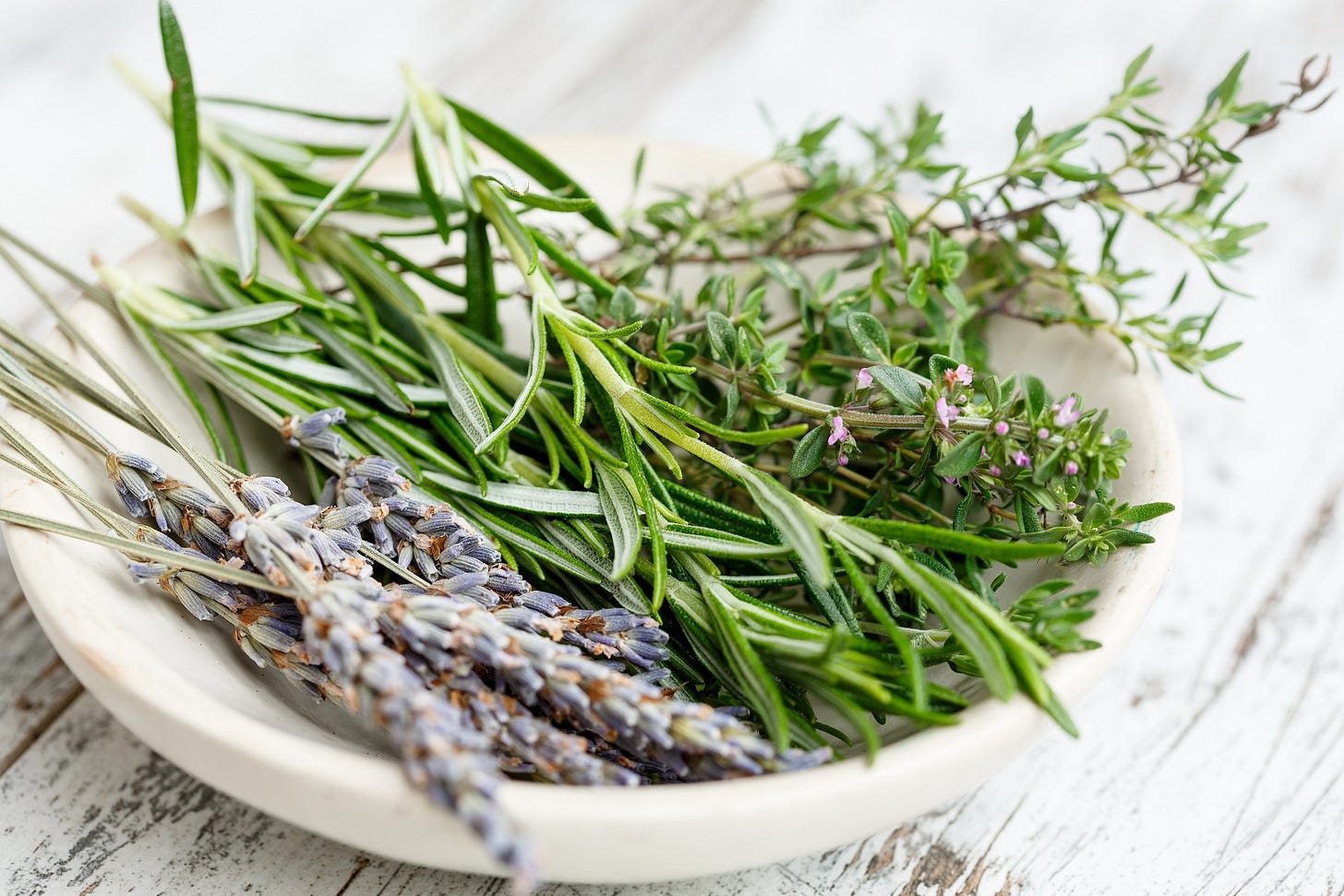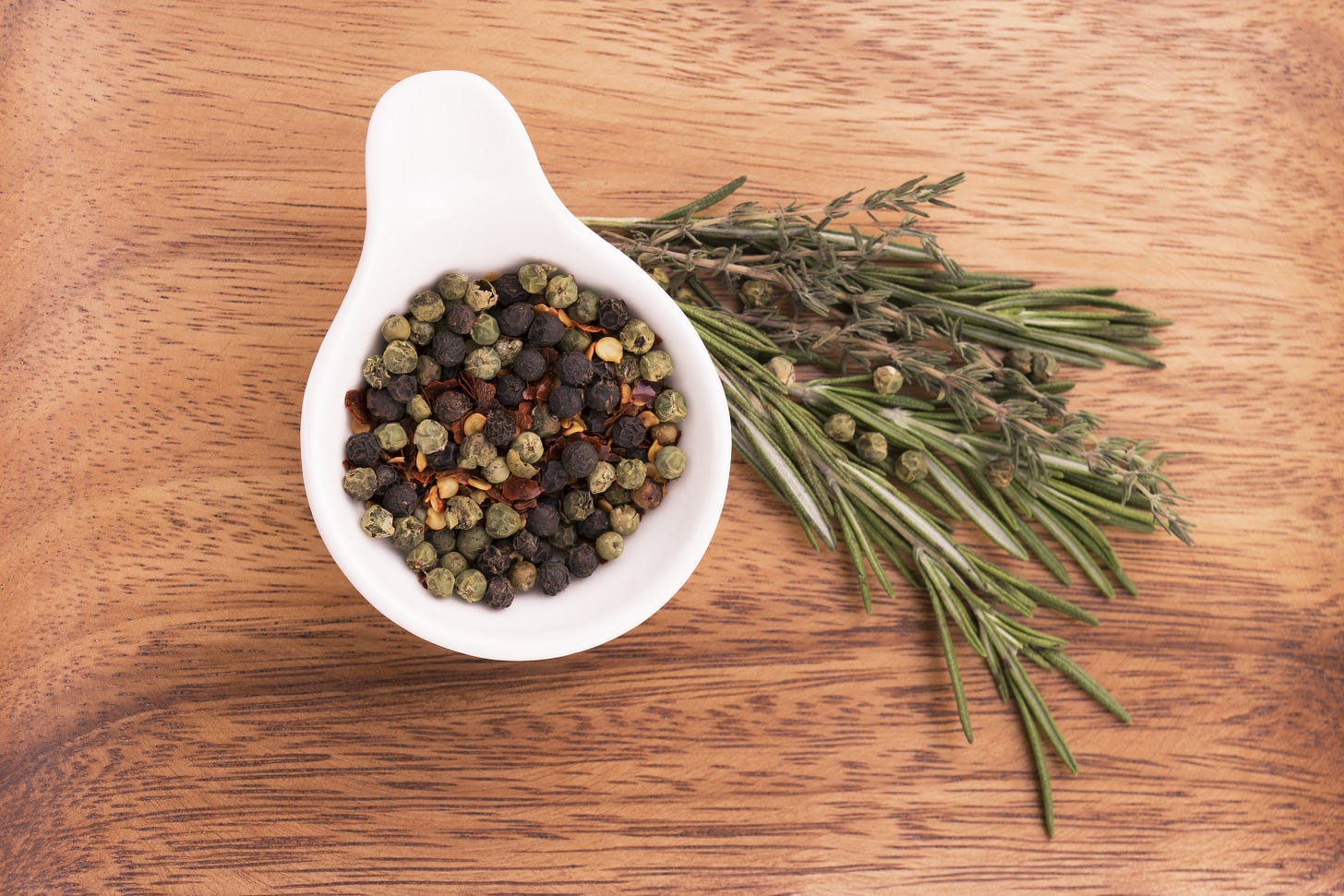The meaning behind a 76-year-old pack of herbs
Old Portuguese folklore rediscovered.

In May of 2021, a few months before I moved to Portugal, I was visiting my father in Florida. At the time he was 94 years old (he’s now almost 96). He was in the process of moving from an independent living community to an assisted living community and I was helping him sort out a few of his things. I noticed something I had never seen before sitting on his home office desk that looked out of place. I couldn’t figure out what it was, wrapped in old crumbling paper and plastic film wrap. And it was yellowed. I almost tossed it, but then thought better of it and asked my father if he had any use for the old packet of whatever it was on his desk. He said yes, it was very important to him. I knew there was a story here, so I asked him to tell me about it.
Herbs for safe journeys.
In 1947 when my dad was twenty years old, he purchased his first car, a 1941 Pontiac Club Coupe. In those days, all you needed was a license and not insurance (which he couldn’t afford anyway), but to get a license you had to have 500 miles of driving experience. So, my dad rode his friend George’s father’s farm truck all around his friend’s farm to accumulate enough miles to get his license.
Once he had his license, my dad’s mother gave him a packet of herbs to keep him safe on his journeys. Since then, dad has always kept this close.
I’ve always had an interest in herbs and at one time had a large herb garden in Rhode Island where I learned a lot about their culinary uses and natural healing properties. I’m sure if my grandmother had been alive (she passed away in 1981), she would have given me some advice about herbs. I asked my dad if he knew what kinds of herbs were in his packet. He didn’t know and didn’t want to open it to find out as everything would probably crumble into dust. I could respect that but was curious as to which types of herbs would have been used for safe journeys.
Since my grandmother was born in the Azores, I wondered if there was some “old country” significance of herbs for safe journeys, so I did a little digging to try to learn more.
Safe travel for sailors and explorers.
Portugal has a rich history of seafaring and exploration. Herbs played a significant role in the lives of sailors and travelers for many centuries to bless and protect them on their journey. The herbs were often steeped in water to create a potion, which was sprinkled or dabbed onto the traveler before setting off. The potions were believed to ward off evil spirits and bring good luck to the traveler. Herbs were also used in the form of amulets, sachets, or teas.
The most popular herbs used in Portugal.
The use of herbs to bless travelers is deeply rooted in old wives’ tales and folklore – not only in Portugal but in many other parts of the world. Even to this day, herbs are used in many rituals throughout the world. Each herb had its own significance, and the choice of herb depended on the traveler’s destination and purpose of the journey.
Lavender was one of the most commonly used herbs in Portuguese travel folklore. Lavender was believed to bring a sense of calm and relaxation to travelers, as well as protection from harm. According to legend, sailors would carry a sachet of lavender with them on long voyages to protect them from the dangers of the sea.
Rosemary was believed to bring good luck and protection to travelers. A sprig of rosemary placed under a pillow was believed to protect the traveler from nightmares and to ensure a restful night’s sleep. It was also believed that carrying a sprig of rosemary with you on your journey would protect you from harm and bring good fortune.
Mint was believed to bring good luck and prosperity to travelers and was often used in the form of a tea or amulet. According to some legends, carrying a sachet of mint on a journey would ensure that you had enough money to complete your travels.
Basil is also an important herb in Portuguese travel folklore. Basil was believed to bring protection and good luck to travelers, and was often used in the form of an amulet or tea. Carrying a sachet of basil on a journey would protect a traveler from harm and bring good luck. Basil was also used to ward off evil spirits and negative energies.

Thyme was believed to bring courage and strength to travelers. Carrying a sachet of thyme on a journey would provide the courage and strength to face any challenges that might arise.
In addition to these herbs, there are a number of other plants and flowers that were commonly used in Portuguese travel folklore. These include chamomile, which was believed to bring peace and tranquility to travelers; sage, which was believed to bring wisdom and clarity; and lemon verbena which was believed to bring good luck and prosperity.
Dad had many journeys.

For most of his career, my father traveled extensively throughout the United States and Mexico as a sales executive for package printing companies. Early on in his career before he owned his own large printing company and could afford to fly around the country, he traveled frequently by car by himself – long before there were cell phones, GPS, or highway emergency call boxes. I know there were times when he might have been in danger – driving through blizzards or getting a flat tire on a remote stretch of road. If he didn’t call each night around dinner time when he was away, my mother would start to worry. He always managed to call, though – even if it was late in the evening.
Although growing up I never saw the packet, I expect dad carried it along with him for many years as a sort of talisman to keep him safe and I suspect, to honor and remember his mother.
Other journeys.

Although I may never know exactly what herbs my grandmother used for my dad’s safe journey packet, as Paul and I make our way through our Portugal journey, I think I’d like to continue her Portuguese folklore tradition. So, I made a few “safe journey” packets of herbs for us.
As I was making my packets, I suddenly remembered that my maternal aunts would always include dried flowers inside the notes or cards they would send to me. I never knew why until now.

My father’s traveling days are over now, but I think that maybe his packet has other meanings for him now that he’s in his nineties. Perhaps holding onto it makes him feel safe and connected to his past as he moves closer to his next journey. Some things like old folklore traditions from our ancestors and loved ones should always be kept close no matter where your journey takes you or how old you are.
Thank you for reading Our Portugal Journey. This blog is a subscriber supported publication but has no paywall – in other words, you can subscribe for free and receive all the content. However, if you find my content valuable, please consider becoming a Supporting Subscriber for a nominal fee either on a monthly or annual basis right here. Just want to buy me a glass of wine? You can do that here.
A special thank you to Jenét for supporting Our Portugal Journey through Buy Me a Coffee. I truly appreciate it!
Until next time…
Obrigada!
Carol.





Wow! Beautifully written! A pleasure to read. Check also the small bunch we collect and keep in Ascensão: Dia da Espiga - https://hortodocampogrande.pt/flores/dia-da-espiga-conheca-a-historia-e-o-simbolismo-desta-data/ and/or the other bunch for Palm Sunday: https://dias-com-arvores.blogspot.com/2005/03/domingo-de-ramos-tradies.html. And the common usage of herbs for infusions, that people pick themselves, prepare and drink.
Muito Obrigado for yet another wonderful story. We are flying to Porto tomorrow to begin our new life somewhere along the Costa Norte. Your posts have been both informative (our U-Crate will -- eventually -- join us in Portugal) and inspirational.